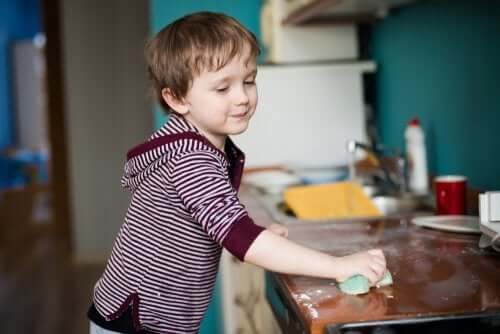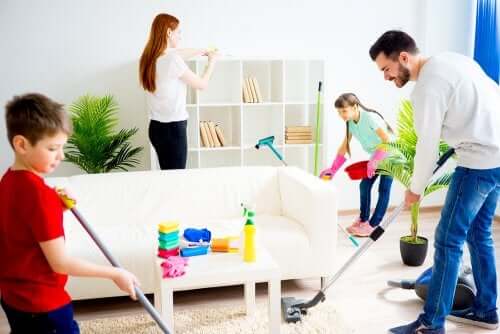How to Help Your Children Get Organized

While some parents don’t care about their children’s messy rooms, others try to help their children get organized in all areas of life, including at school. In this article, we share some tips on how to help your children get organized in any field.
Tips to help your children get organized
Being organized has many advantages and is something children should learn from a young age. If you want to help your children get organized and be more orderly in their room, personal belongings, and even their school tasks, pay attention to the following tips:
1. Break large tasks into smaller ones
For children, perhaps cleaning their entire room in one afternoon is a very onerous task. Thus, to make sure their rooms stay clean, tell your children to go step by step. For example: first they should clean their desk, then their closet, and, finally, what’s on the floor.
Your children need to do one task at a time to be able to concentrate on what they’re doing. There’s no point in saying “You have to clean your room”, as cleaning is a very wide-ranging task.
2. Explain everything step by step
The best way to get organized is to understand the processes and follow a certain order. Each task has a beginning, middle, and end. You should make sure to complete each task to the letter.
For example, if the task is to clear the table after dinner, the first thing should be to clear the dishes, then throw away the leftovers, then place the dishes in the dishwasher, and finally remove the tablecloth.
3. Help your children
One of the best ways to help your children get organized is to get involved in the process. This doesn’t mean that you have to clean up your children’s messes. Instead, you should do the tasks together. You shouldn’t forget that order and neatness is a habit that’s developed with practice.

4. Set a good example
Moreover, it’s essential for children to see their parents being neat and organized. Remember that setting a good example is the best way to educate children. If your children see you putting something away, washing it, or discarding it after using it, they’ll do the same.
You can’t expect children to be neat and organized if you don’t set this example for them.
5. Make lists
Do your children get bored during the holiday season? Do you not want them to spend their entire weekend watching TV? Then, make lists of tasks they have to complete, for example, during the winter break or a holiday.
Although lists may seem boring or too rigid, the truth is that they help people get organized and complete their tasks. You can even list them according to each task’s importance or urgency.
6. Make it a game
No child likes to spend an entire day tidying up. However, if you make it a game, it can be a lot more fun and enjoyable for them. For example, to help your children get organized, you can make up songs for them to sing while they’re tidying up or plan treasure hunts with misplaced objects.

7. Establish routines
Although you may believe that the word “routine” is synonymous with obligation and responsibility, the truth is that children also need them. This includes both lunch or nap time as well as the tasks they do every day.
Therefore, you should make daily or weekly task plans. You can use different strategies, such as calendars, clocks, tables, or drawings. Put them in a visible place, such as on the fridge or on the door of their room… And make sure everyone follows the routines!
To help your children get organized, you have to make sure to keep track of their progress. This means that you shouldn’t just tell them what their tasks or obligations are; you also have to make sure that they fulfill them.
If your children don’t, you have to analyze the reasons why. Were they too difficult? Have your children been playing video games instead of tidying up? Did your children not understand you? Did they need help?
You can ensure a neater and more organized home by working together as a family. It’s worth the effort!
While some parents don’t care about their children’s messy rooms, others try to help their children get organized in all areas of life, including at school. In this article, we share some tips on how to help your children get organized in any field.
Tips to help your children get organized
Being organized has many advantages and is something children should learn from a young age. If you want to help your children get organized and be more orderly in their room, personal belongings, and even their school tasks, pay attention to the following tips:
1. Break large tasks into smaller ones
For children, perhaps cleaning their entire room in one afternoon is a very onerous task. Thus, to make sure their rooms stay clean, tell your children to go step by step. For example: first they should clean their desk, then their closet, and, finally, what’s on the floor.
Your children need to do one task at a time to be able to concentrate on what they’re doing. There’s no point in saying “You have to clean your room”, as cleaning is a very wide-ranging task.
2. Explain everything step by step
The best way to get organized is to understand the processes and follow a certain order. Each task has a beginning, middle, and end. You should make sure to complete each task to the letter.
For example, if the task is to clear the table after dinner, the first thing should be to clear the dishes, then throw away the leftovers, then place the dishes in the dishwasher, and finally remove the tablecloth.
3. Help your children
One of the best ways to help your children get organized is to get involved in the process. This doesn’t mean that you have to clean up your children’s messes. Instead, you should do the tasks together. You shouldn’t forget that order and neatness is a habit that’s developed with practice.

4. Set a good example
Moreover, it’s essential for children to see their parents being neat and organized. Remember that setting a good example is the best way to educate children. If your children see you putting something away, washing it, or discarding it after using it, they’ll do the same.
You can’t expect children to be neat and organized if you don’t set this example for them.
5. Make lists
Do your children get bored during the holiday season? Do you not want them to spend their entire weekend watching TV? Then, make lists of tasks they have to complete, for example, during the winter break or a holiday.
Although lists may seem boring or too rigid, the truth is that they help people get organized and complete their tasks. You can even list them according to each task’s importance or urgency.
6. Make it a game
No child likes to spend an entire day tidying up. However, if you make it a game, it can be a lot more fun and enjoyable for them. For example, to help your children get organized, you can make up songs for them to sing while they’re tidying up or plan treasure hunts with misplaced objects.

7. Establish routines
Although you may believe that the word “routine” is synonymous with obligation and responsibility, the truth is that children also need them. This includes both lunch or nap time as well as the tasks they do every day.
Therefore, you should make daily or weekly task plans. You can use different strategies, such as calendars, clocks, tables, or drawings. Put them in a visible place, such as on the fridge or on the door of their room… And make sure everyone follows the routines!
To help your children get organized, you have to make sure to keep track of their progress. This means that you shouldn’t just tell them what their tasks or obligations are; you also have to make sure that they fulfill them.
If your children don’t, you have to analyze the reasons why. Were they too difficult? Have your children been playing video games instead of tidying up? Did your children not understand you? Did they need help?
You can ensure a neater and more organized home by working together as a family. It’s worth the effort!
All cited sources were thoroughly reviewed by our team to ensure their quality, reliability, currency, and validity. The bibliography of this article was considered reliable and of academic or scientific accuracy.
- Trilla, J., & Novella, A. (2001). Educación y participación social de la infancia. Revista Iberoamericana de Educación.
This text is provided for informational purposes only and does not replace consultation with a professional. If in doubt, consult your specialist.








